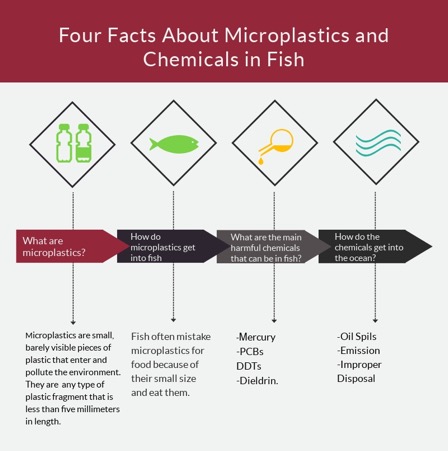
Photo by Jenna Potter
Sushi is a common, well enjoyed meal. What we thought was a harmless meal may induce some harmful effects. Plastics and chemicals that are being polluted into the water can be found in the fish on your dinner plates.
What Are You Really Eating?
Seafood is a main protein for Pescartarians as well as many individuals across the glove, but there may be more than what we anticipate when we dive into our meals.
Over the past few decades there has been an overwhelming emergence of new lifestyles based off of vegetarian and veganism. A vegetarian diet differs from a vegan; vegans don’t consume any animal products but vegetarians only refrain from animal meat.
One alternative diet lifestyle is a pescartarian, this diet strays away from most meats but uses fish and seafood as their main source of protein. Many people take part in these diets for environmental or ethical reasons but the most common cause is for their health. With the mass surge of pollution regarding chemicals and plastics however this cause may be doing more harm than good.
Pollution in our beaches is an ongoing problem that is getting worse by the minute. With plastics and chemicals making their way into not only the water but the sea creatures as well, this problem is becoming more and more destructive.
“Animals at the base of the food chain eat these plastic particles and scientists are concerned that microplastics provide another route for chemical pollutants to move through our food chain, with implications not just for marine ecosystems but also for human health,” said Associate Professor Jane Williamson.

Harmful chemicals find their way into oceans through oil spills, emissions and improper disposal. These chemicals can go into ponds, lakes, or any body of water and eventually end up near fish you may be consuming. Larger fish obtain the chemicals from their food and can land on your dinner plate. The main chemicals in fish that call for concern are mercury, PCBs, sometimes DDTs and Dieldrin. All of these chemicals can cause harm from consumption.
Another main call for concern is from plastics getting into fish, the most problematic ones come from microplastics. Microplastics come from larger plastics that break down into pieces too small to be filtered out into wastewater and end up in larger bodies of water. In the eyes of fish these microplastics look like food and eventually end up in their stomachs.
For pescartarians, this problem hits harder than it may for other individuals. They rely on fish for protein and as their main dish. Although there is no concrete evidence that plastics in fish can cause problems to human health, we should assume harm can be done.
“Researchers have found plastic in whales, mussels and oysters; one study showed that the number of microplastic fragments in oysters averaged 177.”
“I’ve been pescartarian for a little less than four years and fish is my main source of protein. The plastics situation is very concerning because if my food is eating things that are unhealthy, so am I.” said Delaney Reh, Grade 11.
Although plastics and chemicals in fish propose the greatest risk for pescartarians, this problem can be harmful to anyone and everyone. Be a part of the solution by picking up your trash at the beach, engaging in recycling, but also encouraging the ones around you to do the same.